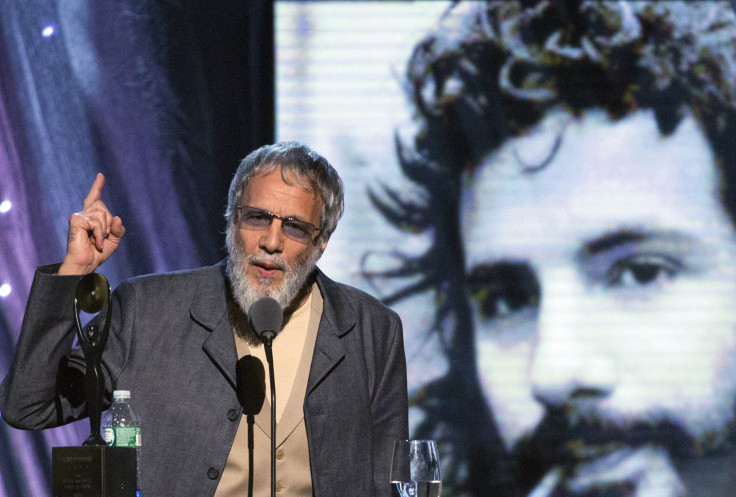Cat Stevens, AKA Yusuf Islam, Kicks Off First North American Tour In 35 Years In Toronto On Monday

Former rock star Cat Stevens, who has gone by the name Yusuf Islam since shortly after his conversion to Islam in 1977, will kick off his first North American tour in decades starting in Toronto Monday night. His tour continues through the U.S., where he has not performed since 1976, starting Thursday in Upper Darby, Pennsylvania, moving to Boston, Chicago, San Francisco, and two dates in Los Angeles, the last of which will be Dec. 14.
The momentous tour is not beginning without controversy for the singer-songwriter who quit performing and even playing instruments in 1977. Stevens canceled his New York City concert, which would have been his first in NYC in 40 years, because of what he called “extortionate” ticket prices on resale websites, a problem he's had with paper tickets since the 1970s, reports the Guardian. He apologized to his fans. “My fans will understand and I thank them for informing me about the extortionate ticket prices already being listed on some websites," he wrote. "I have been a longtime supporter of paperless tickets to my shows worldwide and avoiding scalpers."
Responding to a tweet by the Global News Toronto asking for concertgoers to respond to the tight security measures in place at the Toronto venue, Stevens dismissed the question as trolling.
@globalnewsto @CMarglobal trying to make a story out of nothing? Not surprised. Doors open 2 hours before show. 30 mins earlier than normal
- Yusuf / Cat Stevens (@YusufCatStevens) November 18, 2014A longtime fan complained to the Toronto Star about what he felt were tightened concert restrictions:
- Concertgoers must arrive at least two hours before the concert starts and have government-issued identification that matches the credit card with which the ticket was purchased.
- Ticket holders are prohibited from being able to reenter the concert once they have exited the venue.
- Security is implementing an “airport-style search, including walk-through airport metal detectors.”
The complaining fan, Ric Doedens, said to the Star: "You have to wonder if he (Yusuf) is doing this because he feels threatened." Stevens maintains that the identification request is to make sure his true fans -- and not those who paid scalpers -- are at the concert.
In 1989, when Iran's Ayatollah Khomeini called on Muslims to kill author Salman Rushdie for what he called blasphemous remarks in "The Satanic Verses," Stevens was asked what his thoughts were on the fatwa during a British talk show. Not only did he not condemn the remarks but he suggested that if he were invited to go to the burning of a Rushdie effigy, he'd be disappointed. “I would have hoped it’d be the real thing," he said, a remark that has dogged him ever since. “I never called for the death of Salman Rushdie," he wrote on his website, "nor backed the fatwa issued by the Ayatollah Khomeini -- and still don’t.”
Ten years ago, on a trip to the United States to visit and perform with Dolly Parton, he was sent back after erroneously being put on a no-fly list. And he successfully sued two British newspapers for libel when they accused him of participating in terrorism.
Stevens decided to play music again recently, and in response to Muslims who criticized him, he told Agence France-Presse, "I say: listen to me, this is part of Islamic civilization, we have lost our contact with it, we lost our vibrant approach to life and to culture." This year, he was inducted into the Rock and Roll Hall of Fame.
As a devout Muslim who has spent his music royalties on Muslim schools for children in England and who has received numerous humanitarian awards, Stevens is nevertheless concerned about his musical legacy. "One song I do is 'The First Cut is the Deepest,' he told AFP. "I try to remind people I wrote that song, not Rod Stewart!"
© Copyright IBTimes 2024. All rights reserved.












